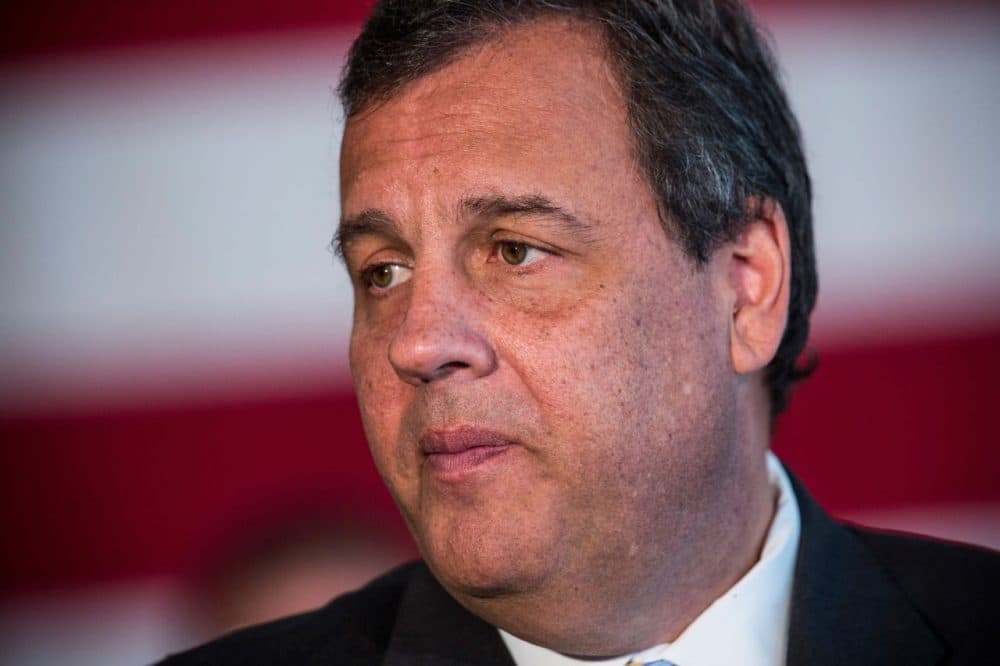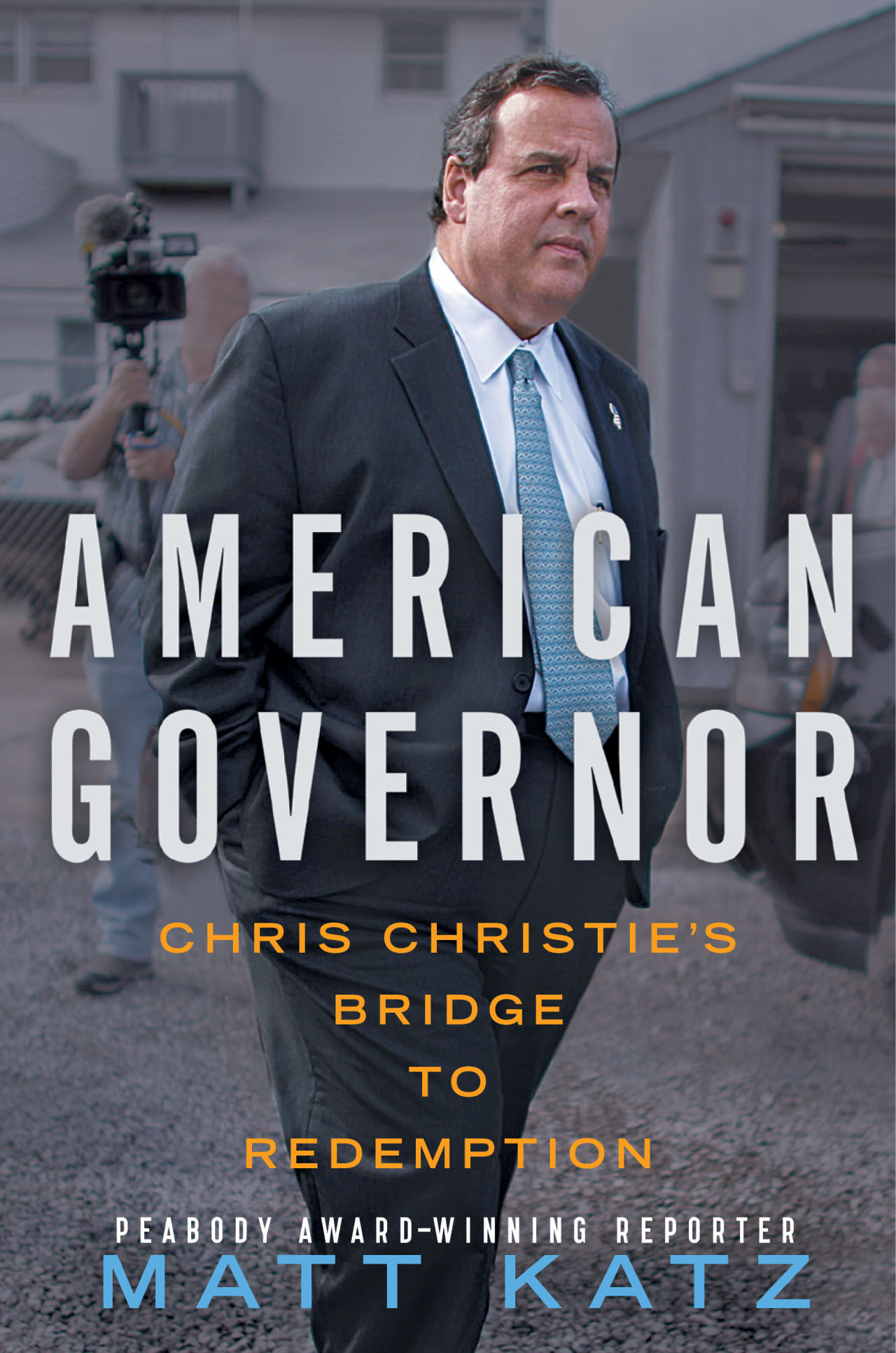Advertisement
Longtime Christie Watcher Pens New Book On New Jersey Governor

New Jersey Governor and presidential candidate Chris Christie came to national prominence in 2012, when Hurricane Sandy devastated his state. His administration then became embroiled in scandal over politically-motivated traffic jams that were found to have been ordered by some of his staff members.
Now Christie is running for president. How does his record play into his chances? Matt Katz, who has covered the governor as a reporter for WNYC and the Philadelphia Inquirer, has written the book "American Governor: Chris Christie's Bridge to Redemption," and joins Here & Now's Jeremy Hobson to talk about it.
Book Excerpt: 'American Governor'
By Matt Katz
Introduction: Moving the Cones

“I worked the cones actually, Matt,” he said. “Unbeknownst to everybody I was actually the guy out there. I was in overalls and a hat. . . . You really are not serious with that question.”
I really was serious with that question.
Christopher J. Christie, the fifty-fifth governor of the state of New Jersey, loomed from behind a massive wooden podium in the ornate ceremonial meeting room of his office at the state capitol in Trenton. His predecessors lined the walls in oil paintings, gubernatorial ghosts that warned of mediocre political fortune. Just one governor of New Jersey had gone on to become president of the United States: Woodrow Wilson. That was in 1913, exactly one hundred years ago.
Christie was poised to recapture the White House for New Jersey. He had just won a landslide reelection as a Republican in one of the most Democratic states in the country. He had come to personify New Jersey not just in the political sphere but also as a national cultural figure, as likely to pop up on E! as on FOX News. And he was beating all the other Republicans in the polls for the next presidential election in 2016—and even tied with Democrat Hillary Clinton, the presumptive Democratic candidate. Years of buzz about his political future had now turned into a full-on clarion call to every pragmatic Republican through the land: Christie had arrived to save the GOP. Exit polls showed that he knew how to win over independents, women, and the majority of Latinos.
Advertisement
Today was Christie’s first press conference back at the Statehouse after his reelection win. He was cocky and combative, as always. So when Christie deflected my question, it was just the kind of mocking sarcasm we were all used to.
CHRISTIE’S PRESENCE, ALREADY physically large, was magnified by the high perch he took behind the podium, above the reporters who sat packed together, shoulder to shoulder, laptops running hot on our thighs, eye level not with Christie but rather with the state seal.
A disembodied horse head was pictured at the center of that seal. “Liberty and Prosperity,” it read.
There was a fireplace behind the podium, but it was never lit. Plainclothes state troopers and top Christie staffers were stationed around the room like sentries, expressionless and seemingly wary of our existence. The room was cold, always, and the wifi was poor, usually.
Reporters shall raise their hands. Permission must be sought before a follow-up can be asked. Keep the questions short. And reading off a notepad, computer screen, or iPhone invites mockery.

With no applause, the governor busted through a tall wooden door next to the fireplace. “All right, all right,” he began. “Good afternoon, everybody.”
A half hour into that press conference, he called on me.
The scandal that I asked him about had been brewing for months. Something bizarre about access lanes from the little town of Fort Lee to the George Washington Bridge. Word was that the governor’s people had closed the lanes to cause massive morning traffic jams for five consecutive days that gridlocked commuters, school buses, and ambulances. Apparently (and this sounded impossibly preposterous) the traffic jams were created to seek revenge on the Fort Lee mayor, who hadn’t endorsed Christie’s reelection.
This was December, and the lanes closed back in September. Christie’s Democratic opponent in the election brought the incident up during a recent debate. She said it showed that Christie and his people were a bunch of bullies.
New Jersey seemed to like the bullying, from the time he instructed the media to “take the bat out” on a seventy-eight-year-old state senator (he meant it journalistically, he later explained) to the time he went after congressional Republicans for blocking billions of dollars in relief money for the biggest natural disaster in New Jersey history.
So when I asked him, “Governor, did you have anything to do with these lane closures in September outside the GW Bridge?” his “I worked the cones” made the crowd, his senior staffers—and maybe a few reporters—laugh.
This was not my first time getting Christie’s sarcastic shiv—after all, I had been covering him for three years at this point—so I persisted. The governor likes to grapple, and challenging him sometimes draws out better answers, ekes out some more truth-telling. And I wasn’t peddling some cuckoo conspiracy theory here—this bridge thing was now the subject of hearings in the state legislature. Documents were being sought. Articles had been written. This was, without question, a news story.
The governor didn’t think so. He did not want to be talking about what I was asking him to talk about. He was going to shut this down right now, and he planned to never hear about it again.
Christie stood by the explanation that the Port Authority of New York and New Jersey, which runs the bridge, had already given: The lanes were closed for a traffic study. He went on to say that he was instructing the Port Authority to “review that entire policy” of having “three dedicated lanes” for Fort Lee. “Because I’ve sat in that traffic,” he said, “before I was governor.” He looked at me and winked. He no longer sat in traffic; for him, as governor, they shut down part of the Lincoln Tunnel to Manhattan.
“The fact that one town has three lanes dedicated to it? That kind of gets me sauced,” he said. And then he attacked the Democratic legislators who had become the lead antagonists on the whole issue.
“I don’t get involved in lane closures. I didn’t work the cones, just so we’re clear on that, that was sarcastic,” he said, to laughter. The Democratic inquiries were just “politics,” he said. “They’re just looking for something, you know? And that’s what they do.”
Before he became governor, Christie was the U.S. Attorney for New Jersey—the chief federal prosecutor for the entire state, best known for winning corruption cases against 130 dirty politicians. He ran for governor as the anticorruption candidate, the one who was going to clean up the notoriously shady halls of the Statehouse in Trenton. That’s what made the scandal—Bridgegate—so shocking. If his top aides conspired to punish enemies with a traffic jam, was the guy who had fought corruption so valiantly now in bed with the very kind of people he was supposed to protect us from?
Christie had proven to be Teflon to controversy. So there was little reason to imagine he wouldn’t get past this bridge situation, either.
Yet the next question proved to be clairvoyant. It came from Michael Aron, reporter for NJTV and the dean of the Trenton political press corps.
“Governor, you’re frequently described as the front-runner for the Republican presidential nomination,” Aron said. “I wonder how comfortable a position that is three years ahead of an election. . . . How do you respond to that appellation”—front-runner—“in front of your name all the time?”
“It doesn’t matter to me. It’s meaningless. It’s December 2013. . . . It will change any number of times between now and then.”
It sure would.
From AMERICAN GOVERNOR: Chris Christie’s Bridge to Redemption by Matt Katz. Copyright © 2016 by Matt Katz. Published by Threshold Editions, an imprint of Simon & Schuster, Inc.
Guest
- Matt Katz, reporter and author of "American Governor: Chris Christie's Bridge to Redemption." In 2015, Matt and a team from WNYC won a Peabody Award for their coverage of Christie and the Bridgegate scandal. He tweets @mattkatz00.
This segment aired on January 26, 2016.